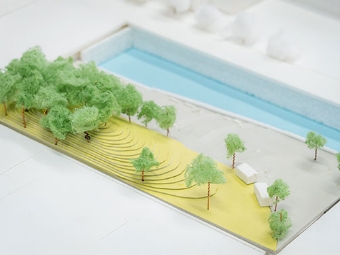Faculty of Engineering
Imagine the future. Creating with engineering.
In the first year, students in the Faculty of Engineering study basic subjects common to all engineering majors; in the second year, they choose one of nine educational courses to which they belong and complete a distinctive educational program in their field of specialization. The goal is to develop engineering professionals with advanced specialized knowledge and practical skills who can flexibly respond to major changes in social and industrial structures brought about by the "super-smart society" and the "fourth industrial revolution," and who are capable of creating products and systems.
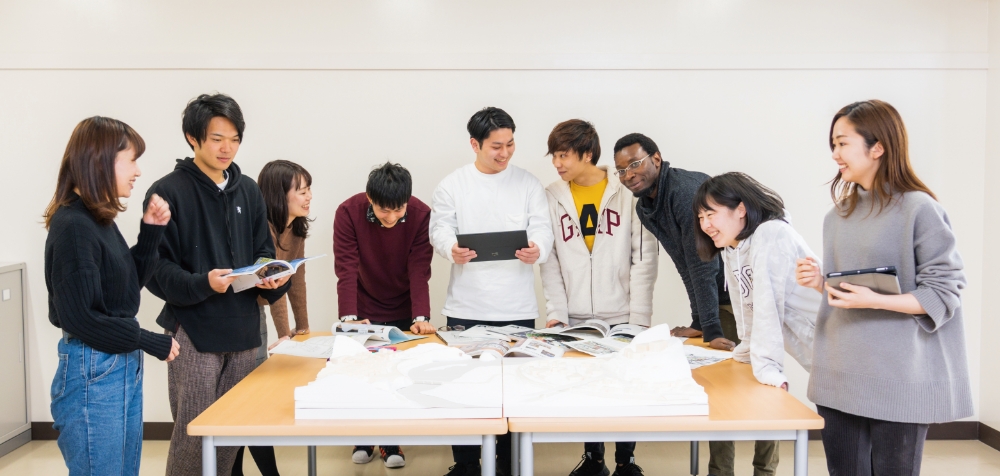
Course Outline
Machinery & Systems
Mechanical Engineering
Mechanical engineering is the foundation of manufacturing. It has been and will continue to be.
Mechanical engineering is a field of study that literally makes machines and enriches society through “monozukuri” (manufacturing). Students learn the knowledge needed to create a wide variety of machines, including automobiles, airplanes, ships, rockets, robots, construction machinery, agricultural machinery, and machine tools that operate in factories. As the basis for this, students are required to study the four mechanics: material mechanics, fluid mechanics, thermodynamics, and mechanics of machines. By learning material mechanics, you can make machines strong enough, fluid mechanics can reduce flow resistance, thermodynamics can change energy into a form that is easy to use, and mechanics can create machines that are resistant to vibration and do not break. Of course, that is not all. There are also machines that run on electricity or automatically through programs given by humans. We also need to be able to obtain and transmit information from the world. Sometimes we also need to protect the technology we have worked so hard to create. Manufacturing is diversifying. For this reason, the Mechanical Engineering course covers subjects necessary for future manufacturing, such as mechatronics, control theory, technical English, and intellectual property.
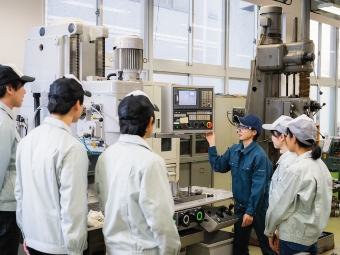
Intelligent Systems Course
Think manufacturing for the future with robotics and control engineering.
The field of modern manufacturing is developing into “smart manufacturing” where IT and artificial intelligence technologies are fused with traditional mechanical engineering to create intelligent products. As a result, many everyday products and industrial devices already consist of a combination of mechanical components and computers.
In the Intelligent Systems course, students learn how to create intelligent “things” as well as how to elucidate the mechanisms of “things” using the principles of physics such as mechanics. Since intelligent systems science is a fundamental study of “manufacturing,” it covers many fields, including robots, welfare equipment, aerospace equipment, automobiles, ships, medical equipment, information equipment, home appliances, industrial plants, materials science, and design and production systems, and has contributed to various industries that support society. It is also an indispensable discipline in the development of “smart manufacturing” in all future industries, and there is no doubt that it will become even more important in the future.
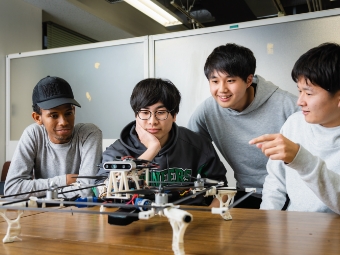
Electrical and Information
Electrical and Electronic Engineering
Learn technologies useful in all fields.
Technologies related to electrical and electronic engineering continue to develop and evolve at a remarkable pace. The latest technologies are fundamental technologies that are indispensable to all industries. In this course, education and research on electricity, electronics, information and communication, including the development of electric energy, high-performance electronic devices, and advanced information and communication technologies, are conducted in a wide range of fields, from the basic to the most advanced. By acquiring a well-balanced educational program in this course, students can advance to any area of electrical, electronics, and information and communication engineering. Our goal is to nurture human resources with a wealth of foresight and originality who can contribute to society at large.
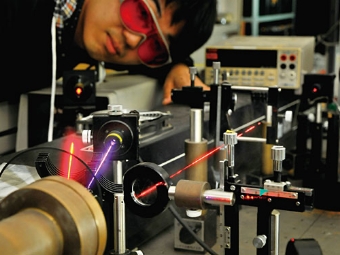
Computer Science Course
Learn AI and IoT technologies for the next era
In the information society, where information plays an important role alongside materials and energy, there is a need for people with expertise in information engineering. Recently, IT engineers are in demand to lead the fourth industrial revolution (also known as Industry 4.0 or Society 5.0) driven by AI (Artificial Intelligence), IoT (Internet of Things), and other factors. The Computer Science course has a curriculum structure that allows students to learn AI, data science, embedded systems, and cyber security in particular, in addition to conventional computer science.
enPiT / enPiT-Pro is a project of the Ministry of Education, Culture, Sports, Science and Technology of Japan (MEXT) to “form a base for developing information technology personnel to support growth fields The enPiT / enPiT-Pro program is a practical education program for undergraduates and working adults under the Ministry of Education, Culture, Sports, Science and Technology’s “Formation of a base for fostering information technology human resources to support growing fields. The Computer Science Course is participating in the enPiT Emb / enPiT-Pro Emb program, which is an initiative in the area of IoT embedded systems.
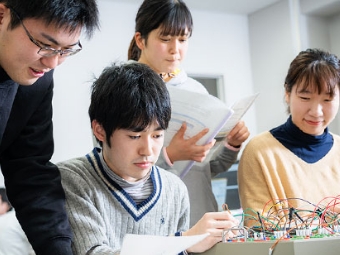
Applied Information Engineering Course
A place where students can become ICT experts equipped with knowledge and wisdom and with the ability to apply it.
That is the Applied InformationTechnologyCourse
In the Society 5.0 super-smart society created by information and communication engineering such as IoT, AI and Big Data, the ability to apply information and communication technology to social issues will determine its success or failure. The Applied Information Engineering course engages in research and development to solve “problems in the world” and realize “people’s dreams. This is a place where students can grow to become engineers and researchers who are equipped with knowledge and wisdom to realize their dreams. The course is highly regarded for the achievements of the efforts made by the faculty members in charge of the Applied Information Technology Course, and students’ participation in the projects has been highly successful as a learning experience, with cooperation and collaboration not only with companies in the information and communication fields, but also with companies from other industries, a wide range of industrial fields, and local governments.
As a partner university in the “Formation of a Center for Human Resource Development in Information Technology Supporting Growth Fields (Phase II enPiT),” the Applied Information Technology Course is engaged in FD activities aimed at developing and disseminating educational methods and practicing education incorporating group activities such as idea-thons and PBL.
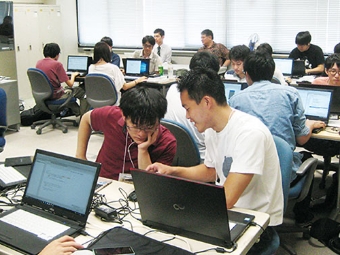
Materials & Chemistry
Materials Design Engineering Course
Fun and earnest, everyday rear, materials
Industry is now making great strides toward a smart and sustainable society, but various challenges have emerged in realizing these goals. While the focus tends to be on the software side, research and development of hardware, such as innovative sensors that handle large amounts of data to realize AI, has lagged behind.
The Materials Design Engineering course was created to meet these social needs. The word “design” may bring to mind pictures and graphics, but it also means “to plan something for a specific role, purpose, or effect. In recent years, the problem-solving process called “design thinking” has been attracting attention, and the Course of Materials Design Engineering provides an educational program to foster the ability to create innovative materials based on this design thinking. Why don’t you enjoy a fulfilling campus life in the Materials Design Course?

Chemistry and Life Science Course
‘Create something useful for society based on the knowledge and technology of chemistry.’
We aim to develop human resources who can present solutions to society’s problems by comprehensively utilizing knowledge and technology in chemistry and the life sciences. We aim to develop human resources who understand the role of chemistry in society and who can appropriately utilize cutting-edge science and technology from a global perspective and through multifaceted judgment.
In this course, students learn specialized knowledge of chemistry and experimental and research methods, and are tentatively assigned to a laboratory from the second semester of their junior year. In their graduation research, students will acquire the ability to tackle a variety of problems by actually conducting cutting-edge research. In addition, part of our education and research is conducted in cooperation with the Proteoscience Center.
Another feature of this course is that students can obtain a first-class license to teach high school science, and those with outstanding grades can enter the workforce early through early graduation and completion of the course.
The course trains students to acquire the basics of chemistry, apply their knowledge, and tackle a variety of problems.
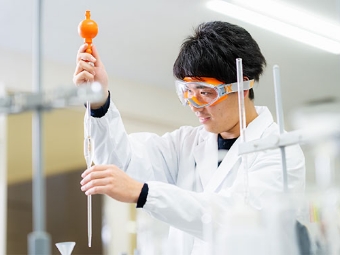
Civil and Environmental Engineering
Civil Infrastructure Engineering Course
Creating a Safe and Comfortable Society
Our cultural life is supported by social infrastructure. Lifelines such as water, electricity, and gas, as well as roads, bridges, railroads, ports, and information and communication facilities, are indispensable for our comfortable lives. Recently, natural disasters such as huge earthquakes and typhoons have been occurring frequently, and the development, maintenance, and improvement of social infrastructures that enable people to live with peace of mind is a global challenge. These efforts must be carried out in harmony with the rich natural environment. In order to hand down a more prosperous society to the next generation, it is necessary to develop technologies related to social infrastructures.
The Civil and Environmental Infrastructure Engineering course aims to develop human resources capable of creating a safe, comfortable, and sustainable society. The course provides practical education by staff engaged in cutting-edge research so that students can respond flexibly to the changes in society brought about by climate change, globalization, and other factors.
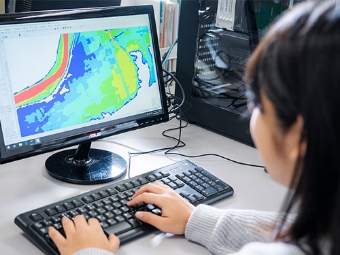
Social Design Course
Designing a prosperous future society
In order for us to lead affluent lives, it is essential to develop social infrastructure such as convenient transportation networks and levees to protect human lives from tsunamis and floods. We also need to create a comfortable urban environment and develop cities that minimize damage from disasters through disaster prevention activities. In order to meet these social demands, it is necessary to listen to the opinions of various people and consider measures that will bring happiness to society as a whole. For this purpose, not only scientific knowledge and technology but also humanistic thinking such as sociology and economics are useful.
The Social Design Course in the field of civil engineering and environment actively accepts students in the humanities as well as the sciences to foster engineers with a broad perspective who can realize a prosperous future society. The course provides an education that integrates the humanities and sciences in order to nurture human resources capable of designing society in an integrated manner to meet a variety of needs, including disaster and environmental countermeasures.
